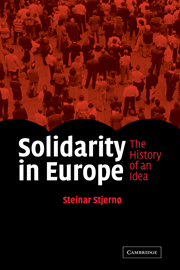Book contents
- Frontmatter
- Contents
- List of tables
- Acknowledgements
- List of abbreviations
- Introduction: to study the idea of solidarity
- Part I Three traditions of solidarity
- Part II The idea of solidarity in politics in Western Europe
- Part III The present precariousness of solidarity
- 9 Solidarity in modern social philosophy and Christian ethics
- 10 Epilogue: hope and challenges – individualisation, consumerism and globalisation
- References
- Index
9 - Solidarity in modern social philosophy and Christian ethics
Published online by Cambridge University Press: 29 March 2010
- Frontmatter
- Contents
- List of tables
- Acknowledgements
- List of abbreviations
- Introduction: to study the idea of solidarity
- Part I Three traditions of solidarity
- Part II The idea of solidarity in politics in Western Europe
- Part III The present precariousness of solidarity
- 9 Solidarity in modern social philosophy and Christian ethics
- 10 Epilogue: hope and challenges – individualisation, consumerism and globalisation
- References
- Index
Summary
In previous chapters we have seen that there are several ideas of solidarity in politics in Europe. These ideas grew out of different historical and ideological traditions; Marxism, socialist revisionism, Catholic social teachings, nationalist ideas about the nation and the race. At the beginning of the twenty-first century, two of these traditions are particularly influential in European politics: social democracy and Christian democracy. During the latter part of the previous century both types of party have developed a political language in which the concept of solidarity is firmly integrated and bound together with other key values that are generally highly valued. From the other traditions, Marxism and fascism, only remnants remain. The price of success of the concept of solidarity, however, is that it has lost, if it ever possessed it, a clear meaning. The problem is not only that it is difficult to identify an ‘ineliminable’ core of the concept, but also that the meaning varies according to how it is related to the other key values of social democratic and Christian democratic values.
The fluidity and looseness of the concepts of solidarity in party politics give rise to intellectual dissatisfaction. Consequently, we must seek the most outstanding thinkers of our time and investigate to see if they may be able to assist us in clarifying the concept and understanding of what solidarity is all about.
- Type
- Chapter
- Information
- Solidarity in EuropeThe History of an Idea, pp. 287 - 326Publisher: Cambridge University PressPrint publication year: 2005

